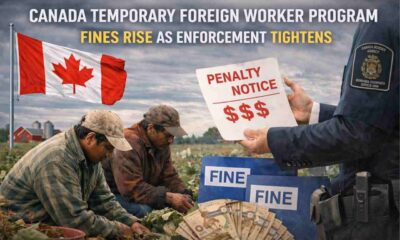Immigration Announcement
CSIS Security Screenings Cause Major Delays for Citizenship and Asylum Applicants

If you’re waiting on a Canadian citizenship or asylum application, you may have noticed a worrying trend — processing times are stretching longer than ever. A key reason? A sharp rise in CSIS security screening assessments. In 2024 alone, the Canadian Security Intelligence Service (CSIS) received over 500,000 screening requests from immigration authorities, a significant jump compared to previous years. And for many applicants, this additional step is creating months, even years of uncertainty.
What Is a CSIS Security Screening?
When Immigration, Refugees and Citizenship Canada (IRCC) or the Canada Border Services Agency (CBSA) suspect that an application requires further review, it can be referred to CSIS for a security assessment. The purpose is straightforward — identify and address any potential threats to national security before granting status. While the process protects Canadians, it also adds time to application processing. The timeline varies widely, depending on individual cases and the complexity of the screening.
Who Is Being Screened the Most?
According to CSIS’s 2024 report, here’s the breakdown of requests by applicant type:
| Type of Applicant | Requests in 2024 | Percentage |
| Citizenship | 319,700 | 59% |
| Refugees & Asylum Claimants | 151,400 | 28% |
| Permanent Residents (inside/outside) | 22,500 | 4% |
| Temporary Residents | 44,500 | 8% |
| Total | 538,100 | 100% |
Notably, 87.5% of all screenings were for citizenship applicants or asylum seekers, meaning delays are far more common in these two groups.
Why Are CSIS Security Screenings Increasing?
Several factors are driving the surge in screenings:
- Higher immigration volumes – Canada’s targets were historically high in recent years, creating larger backlogs.
- Rising asylum claims – Every asylum claimant undergoes security screening, adding to the workload.
- Global geopolitical conflicts – Applicants from regions in political turmoil, such as Ukraine, Gaza, and parts of the Middle East, often require deeper checks.
For example, Canada pledged temporary residence to 5,000 individuals from Gaza in 2023–2024, a region governed by a listed terrorist entity, requiring intensive screening.
How Long Are the Delays?
There’s no set timeline. Some applicants clear the screening in months, while others wait years.
One refugee interviewed by the Toronto Star had been in processing for more than two years, with security screening alone taking over a year.
Will Delays Improve Soon?
The short answer: unlikely. Even with reduced immigration targets for 2025–2027, the existing backlog and focus on high-risk categories mean screening times may remain lengthy. Citizenship applicants, in particular, aren’t included in annual immigration targets, so their numbers can continue to rise without directly affecting quotas.
Frustration Among Applicants
In 2024, complaints about CSIS activities rose by 200%. Despite this, CSIS has stated that complaints do not result in expedited processing. The agency maintains that careful review is essential to protect Canadian security, regardless of delays.
What Can Applicants Do to Reduce Delays?
While you can’t control whether you’re selected for screening, you can minimize avoidable setbacks:
- Submit a complete application with all supporting documents (police certificates, biometrics, travel history).
- Ensure accuracy – errors or missing details can trigger further review.
- Consult an immigration professional – a regulated immigration consultant can spot potential issues before submission.
- Address criminal records early – if applicable, seek legal advice to understand how your history may affect your case.
CSIS Security Screenings Cause Major Delays for Citizenship and Asylum Applicants
The rise in CSIS security screenings has become a significant hurdle for many applicants, especially citizenship hopefuls and asylum seekers. While these measures are essential for national safety, they add another layer of complexity and waiting to an already challenging process. By preparing complete, accurate applications and seeking professional guidance, applicants can at least reduce the risk of unnecessary delays — and position themselves for a smoother path once security clearance is granted.
























